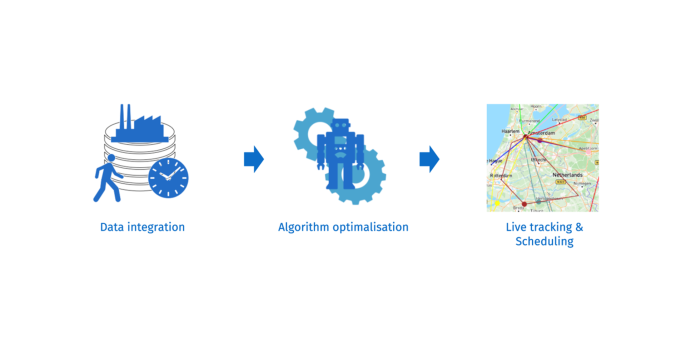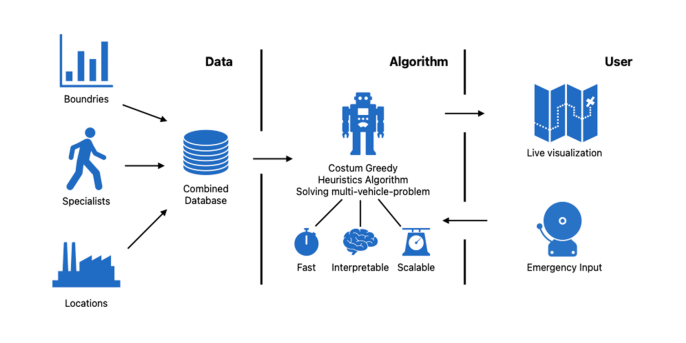20. October 2025 By Simon Akkerman
FleetScheduler
Optimizing field team routing, scheduling, and cost management through intelligent automation.
The Operational Challenge of Inefficient Field Coordination
Every day, organizations lose valuable time and resources due to inefficient route planning, poor workload distribution, and reactive task management. Without intelligent coordination, travel costs rise, productivity drops, and specialized talent is often underutilized.
These inefficiencies represent a hidden drain on operational budgets. Studies show that field-based organizations can waste a significant amount of labor and fuel costs due to manual route planning and misaligned resource allocation. For companies managing distributed engineering or service teams, this can translate into hundreds of lost working hours per month — directly impacting profitability and service quality.
When unexpected issues or emergencies arise, managers often lack real-time visibility into team locations and availability, making it difficult to respond quickly or efficiently without disrupting existing schedules.
The Challenge with Manual Scheduling
Without intelligent tools, managing mobile workforces becomes a reactive and error-prone process.
Managers face several recurring challenges:
- Time-Consuming Planning: Coordinating routes, skills, and priorities manually consumes significant management hours.
- Skill Mismatch: Engineers may be sent to tasks they aren’t best suited for, leading to rework or downtime.
- Limited Visibility: A lack of real-time insight into schedules and movements makes it hard to adapt when conditions change.
Our Solution: FleetScheduler
FleetScheduler automates field team coordination through intelligent route optimization, skill-based task allocation, and real-time visualization.
The platform ensures every engineer is deployed efficiently — to the right place, at the right time, with the right skills — minimizing travel time, reducing costs, and maximizing operational impact.
How It Works
FleetScheduler follows a clear, automated process for optimizing daily operations:
- 1. Data Input: Managers upload task or venue information along with engineer skill profiles and availability.
- 2. Smart Assignment: FleetScheduler automatically matches each issue with the most suitable engineer based on skills, proximity, and cost efficiency.
- 3. Optimized Routing: The system calculates the most efficient travel sequence, minimizing distance and idle time.
- 4. Dynamic Visualization: An interactive map and timeline display real-time engineer movement, progress, and emergency responses.

Benefits to Organizations
- 1. Lower Operational Costs: Reduces fuel use, travel time, and administrative overhead.
- 2. Skill-Driven Efficiency: Ensures every task is handled by the most qualified engineer.
- 3. Real-Time Adaptability: Instantly responds to emergencies or scheduling changes without disrupting the day’s workflow.
- 4. Predictive Maintenance Integration: Designed to integrate seamlessly with predictive maintenance systems, enabling proactive scheduling of repairs and inspections before failures occur.
- 5. Higher Productivity: Frees managers from manual planning and boosts team throughput.
- 6. Data-Backed Oversight: Provides full visibility into task progress, costs, and performance metrics.
Technical Implementation
- 1. Developed with Streamlit and PyDeck for an intuitive, interactive web interface.
- 2. Python-based optimization engine implementing a custom multi-vehicle routing heuristic with skill constraints.
- 3. Automated distance and time calculations for realistic scheduling.
- 4. Dynamic timeline engine allowing live updates and emergency handling.
- 5. Scalable and modular design ready to expand across teams, regions, or industries.

Conclusion
By automating route planning, skill matching, and cost optimization, FleetScheduler enables organizations to move from reactive management to proactive, data-driven operations. Its modular design makes it the foundation for the next generation of connected maintenance ecosystems — where intelligent routing, real-time monitoring, and predictive insights work seamlessly together to prevent downtime before it happens.

